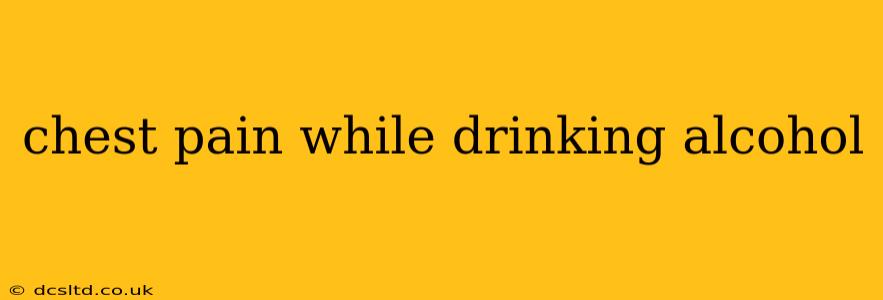Experiencing chest pain while drinking alcohol is never something to take lightly. While it can sometimes be attributed to indigestion or heartburn, it's crucial to understand that chest pain can also indicate a serious underlying medical condition. This comprehensive guide explores the various reasons why you might experience chest pain after or during alcohol consumption, helping you differentiate between minor discomforts and potential emergencies.
What Causes Chest Pain When Drinking Alcohol?
The relationship between alcohol consumption and chest pain is complex and multifaceted. Several factors can contribute, ranging from relatively benign issues to life-threatening ones:
-
Gastroesophageal Reflux Disease (GERD): Alcohol relaxes the lower esophageal sphincter, allowing stomach acid to reflux into the esophagus, causing burning chest pain often mistaken for a heart attack. This is a common cause of chest pain, especially after consuming large amounts of alcohol.
-
Heartburn/Indigestion: Similar to GERD, alcohol can irritate the stomach lining, leading to indigestion and heartburn, resulting in a burning sensation in the chest.
-
Panic Attacks: Alcohol can exacerbate anxiety, potentially triggering panic attacks. These attacks can manifest as chest pain, shortness of breath, and rapid heartbeat.
-
Esophageal Spasms: Alcohol can trigger spasms in the esophageal muscles, causing intense chest pain that can be sharp and sudden.
-
Coronary Artery Disease (CAD): In individuals with pre-existing coronary artery disease, alcohol can worsen the condition, leading to chest pain (angina). Alcohol can increase blood pressure and heart rate, placing additional stress on the heart.
-
Myocarditis (Heart Muscle Inflammation): Excessive alcohol consumption can damage the heart muscle, leading to inflammation and chest pain. This is a serious condition requiring immediate medical attention.
Is Chest Pain After Drinking Alcohol a Heart Attack?
This is a crucial question, and the answer is: possibly, but not necessarily. While many causes of chest pain after drinking alcohol are not life-threatening, some, like CAD and myocarditis, are serious cardiac events. The symptoms of a heart attack can mimic those of other conditions, making it difficult to self-diagnose. Chest pain accompanied by shortness of breath, sweating, nausea, or radiating pain down the arm requires immediate medical attention.
How Can I Tell if My Chest Pain is Serious?
Differentiating between benign and serious causes of chest pain requires careful consideration of accompanying symptoms and your medical history. Seek immediate medical attention if your chest pain:
- Is severe or crushing.
- Radiates to your jaw, neck, back, or arm.
- Is accompanied by shortness of breath, sweating, nausea, or lightheadedness.
- Feels different than any chest pain you've experienced before.
- Persists for more than a few minutes.
What Should I Do if I Experience Chest Pain After Drinking Alcohol?
If you experience chest pain after drinking alcohol, prioritize your safety and well-being:
- Stop drinking immediately.
- Rest in a comfortable position.
- Avoid strenuous activity.
- Take slow, deep breaths.
- If symptoms are severe or persistent, seek immediate medical attention by calling emergency services.
Can Alcohol Cause Long-Term Heart Problems?
Yes, long-term and excessive alcohol consumption can significantly increase your risk of developing various heart problems, including:
- High blood pressure: Alcohol can elevate blood pressure, straining the heart over time.
- Cardiomyopathy: Damage to the heart muscle leading to weakened pumping ability.
- Arrhythmias: Irregular heartbeats.
- Stroke: Alcohol can increase the risk of stroke.
When Should I See a Doctor About Chest Pain?
It's essential to consult a doctor if you experience recurrent or persistent chest pain, even if it's seemingly mild. Regular check-ups and open communication with your physician are vital for maintaining your cardiovascular health.
This information is for general knowledge and does not constitute medical advice. Always consult a healthcare professional for any health concerns or before making any decisions related to your health or treatment.
